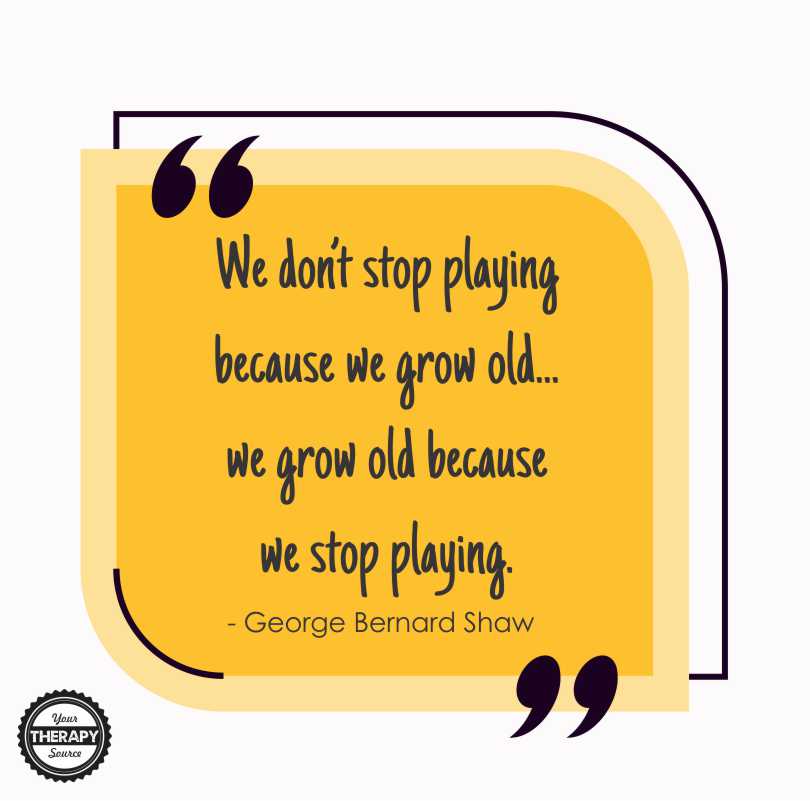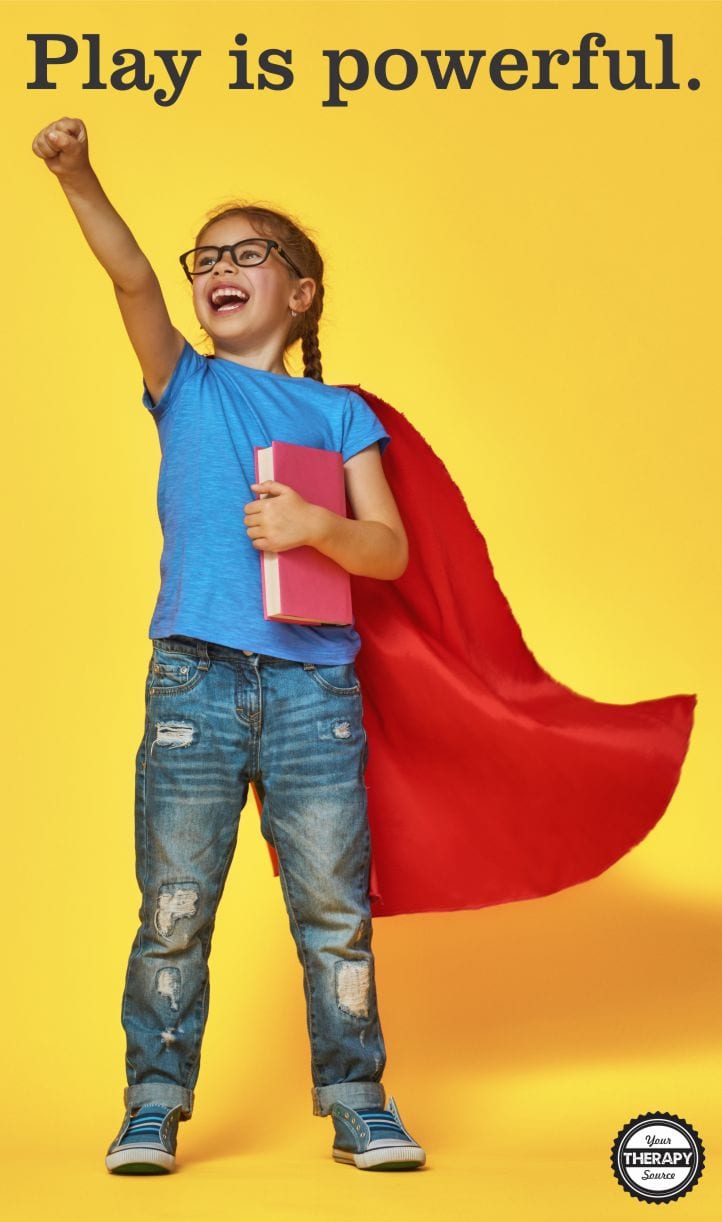Play Quotes to Remind Us Why PLAY is so IMPORTANT

As professionals and parents, many of us are strong advocates for educating others of the importance of play in children’s lives. Over the past thousands of years, famous people have been so wise about the power of play. Here are 25 play quotes to remind us why PLAY is so IMPORTANT in the life of a child.
Remember play can be simple. It doesn’t require elaborate preparation, materials or toys. What it truly requires is TIME. We must provide children with the opportunity of open-ended play with family and friends. This is where fine motor, gross motor, visual perceptual, cognitive, social, emotional, and self-regulation skills can all be developed and nurtured.
Play Quotes
Here are 25 play quotes from a range of viewpoints. Of course, I have to start off with my favorite from Fred Rogers! It is so simple but so powerful. To me, play provides children with a strong framework of internal motivation to practice what they are learning. They can be self-driven and will practice higher levels of self-regulation to accomplish a task during play time. It is a basis of what many pediatric pediatric therapists do – teach skills through play!
“Play gives children a chance to practice what they are learning.” -Mr. Rogers
“Play is the only way the highest intelligence of humankind can unfold.” -Joseph Chilton Pearce
“It is paradoxical that many educators and parents still differentiate between a time for learning and a time for play without seeing the vital connection between them.” -Leo F. Buscaglia
“Play is the exultation of the possible.” -Martin Buber
“Play keeps us vital and alive. It gives us an enthusiasm for life that is irreplaceable. Without it, life just doesn’t taste good” -Lucia Capocchione
“Work consists of whatever a body is obliged to do. Play consists of whatever a body is not obliged to do.” -Mark Twain
“We don’t stop playing because we grow old; we grow old because we stop playing.” -George Bernard Shaw

“Play is the beginning of knowledge.” -George Dorsey
“Play is so integral to childhood that a child who does not have the opportunities to play is cut off from a major portion of childhood.” -Musselwhite
“Necessity may be the mother of invention, but play is certainly the father.” -Roger von Oech
“We are never more fully alive, more completely ourselves, or more deeply engrossed in anything than when we are playing.” -Charles Schaefer
“It is a happy talent to know how to play.” -Ralph Waldo Emerson
“Play is our brain’s favorite way of learning.” -Diane Ackerman
“Almost all creativity involves purposeful play.” – Abraham Maslow
“Whoever wants to understand much must play much.” -Gottfried Benn
“The true object of all human life is play.” -G. K. Chesterton
“Children need the freedom and time to play. Play is not a luxury. Play is a necessity.” -Kay Redfield Jamison
“Do not keep children to their studies by compulsion but by play.” -Plato
“The creation of something new is not accomplished by the intellect but by the play instinct.” -Carl Jung
“Children learn as they play. Most importantly, in play children learn how to learn.” -O. Fred Donaldson
“The opposite of play is not work. It’s depression.” Brian Sutton-Smith
“Those who play rarely become brittle in the face of stress or lose the healing capacity for humor.” -Stuart Brown, MD
“In every real man a child is hidden that wants to play.” -Friedrich Nietzsche
“If you want to be creative, stay in part a child, with the creativity and invention that characterizes children before they are deformed by adult society.” -Jean Piaget
“The playing adult steps sideward into another reality; the playing child advances forward to new stages of mastery.” -Erik H. Erikson
How to Give Children the Gift of Play
Rather than overscheduling today’s children, here are 5 tips to help give children the gift of play:
- Make play a priority. Sometimes we have to say no to certain outings, events or activities. Family life is challenging enough but downtime, where kids can just be kids, is a necessity for children.
- Allow for independence. If your children are old enough, leave them alone. Don’t hover. This will help you and them. They will argue and settle it without you ever even hearing it all! They will fail and succeed and you will only hear about the success stories.
- Provide some lead in activities. Sometimes, children need a little guidance and direction so you can set the stage. For example, print off some pages from the Doctor and Hospital pretend play packet and leave them on the table with a clipboard and a pen. The kids can then continue to play from there to create an imaginative world.
- Make yourself busy but with nothing too exciting. If you are busy completing a task, most likely the kids will occupy themselves with play. If you are busy watching videos on your phone, most likely the kids will surround you (Murphy’s Law). Choose wisely.
- Schedule it! I know that may sound ridiculous to some parents but since there are 6 kids in our house and 2 adults with insane schedules if we didn’t set aside time for play my kids would lose out.
Need Visual Reminders About the Importance of Play?
Play Typography Art digital download includes 16 words related to play and the definition for simple decor that makes a statement. Play is powerful as is this typography art. Make a statement in a clinic, classroom, playroom, or child’s bedroom to remind educators, parents, and children of the importance of play.
RELATED POSTS
Stages of Play
Way back in 1932, Mildred B. Parten developed a system for classifying participation in play. This organization of play is still used today to describe how play develops in children.There are 6 developmental stages of play in children. Read about the Stages of Play here.
Parallel Play
Parallel play is one of six stages of play that occur as a child moves from solitary play to cooperative play with coordinated activities, communication, and rules. Each child is different, but parallel play usually emerges when they’re about 2 or 3 years old. Read how you can help develop parallel play in children here.
Benefits of Risky Play
Risky play has been defined as thrilling and exciting play that sometimes may include the possibility of real injury. But guess what? Kids can benefit from this type of play for so many reasons. Read more here.
Inclusive Play
Inclusive play can help to provide opportunities for children to have fun experiences, access toys, make new friends, social skills, develop motor skills and more! Read more about inclusive play here.




